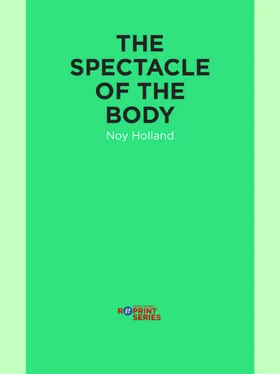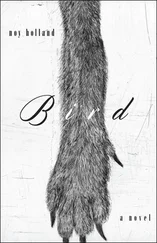RC nods his head wildly.
“We’re trying to take a picture, Ida. Why don’t you go outside?” Arnold says. He snaps a picture. He will bring it back on porcelain and stash it in the bank box.
“Go outside?” Ida says.
A cry breaks from RC’s throat that sounds more dog than human. “He wants to go outside!” Ida says. “Lookit here, I got it!”
The four of them — Opal and Ida on one side, Verda and Arnold on the other — make a throne with their arms to bear him out, to sit him down on the church pew. RC twists in the pew and swipes at the wreaths Verda has hung on the wall. He knocks a bloom off. He knocks a wreath off its nail in a puff of dust and it drops behind the church pew.
His eyelid flutters. He sucks his cheeks between his teeth, winks his lips together. His lips start turning blue.
“God above,” says Opal.
He sucks his cheeks in deeper and, with his finger, flattens the fleshy tip of his nose so that it looks to be even less a nose than a pair of holes in his head. The girls try not to look at him, at the new mess he is making, piggish, fishy, of the face they have come to know.
“Quit,” Verda says. “That’s enough, RC.”
She shakes him by his shoulders, but he won’t quit. She shakes him harder, his neck limp, his head making a funny, rubbery sound when it knocks against the wall. RC tries to think back. He knows the fish head hung there, above the pew where the wreaths are now. But he cannot remember it quite, how it looked there, forgot, before they carried him out, that it would not be there at all. He does not mind, is grateful, even, for the sound of his head when it knocks against the wall. It keeps him thinking.
RC thinks of the crappies he used to catch when the river used to flow. He hears in the sounds of his own head the sound of the heads of the crappies made when he hit them against a stone. He didn’t mind that. But it took a whole string of them — slender, fine-boned things — to dent a big man’s craving, to feed the growing hunger RC felt back then. Crappies, hell, RC thinks, who would sooner be a giant eased out of the Gulf of Mexico, an eyesore, a hazard, flesh enough to feed for days a town like Union City, bones as thick as fingers, talk, sooner, RC would be, a lasting trouble, a mighty rottenness that never goes away.
They settle in beside him. Arnold pulls the trip from the Polaroid and they huddle in to watch it make, to see it changing. Verda thinks he sees in it something of the boy she knew. This sends her to the bank box to pat around in the webby dark, feeling for the flaking envelope, the rotten elastic band.
“Here you are with that cow,” Verda says. “Here is that old beagle.”
She passes RC the photographs he remembers from the carnival, and he remembers that this is the way he has seen since the day he came from Memphis, the day the days started turning, even before they passed, into a glossy flatness, a shabby souvenir.
Ida scoots up against him, leaning in to see. She is perfumed, Ida, these springy days; her earlobe, poked through her netted hair, brushes RC’s chin. She listens to him breathing.
A slow leak of blood from his scalp — the skin split when he struck his head — dribbles around from behind his neck.
“Ida, move. Let me in there.” Verda dabs at his neck with a tissue. “Let me please sit down.”
Ida, giving up her seat, takes the envelope from Verda, slips the photos from RC’s hand. She paces in front of the church pew, holding her hands behind her. She walks the way that RC walked, the floorboards squalling.
“Back in the hungry, runaway years when you were ten, eleven,” Ida says — she has his preachy way of speaking—“you went off with a carnival, walked off in your boots down the dirt road that ran through the harrowed bottomland, leading your six-legged beagle, leading your borrowed cow.”
The cow had a freaky canker, a mushy malignancy growing up from its shoulder bone. It is what made the cow a two-headed cow, a sidebar for the knee-high horse, a two-for-one enticement that fished the nickels from schoolboys’ pockets.
“You got as far off as Sarasota,” Ida says, “isn’t that right, RC?”
She walks the photographs of Sarasota along, pausing a time with each of them in front of each of their faces — blue days, pictures of blue days, of sequined girls in ostrich plumes, barefoot in a froth of tide, clapping at RC.
Here is RC on a cinder block, trying to hold his fish up; he has slipped his arms under the giant gills and hefted the fish as high as his chin, as high as it looks like he is able, without being nearly able to lift its tail out of the sand.
Its tail, we remember, was silver. We remember a cart on the courthouse steps, a scrap-wood contraption with a worn tarp tossed across it. We remember the brittle horn RC blew until the houses emptied, the photographs, wicking sweat, he pulled from his back pockets.
“What in the world?” we asked him. He was pacing on the courthouse steps — a boy still in his limber years, his leg swelled stiff to a man’s size from drinking bad shine.
“You had to swing the damn thing around you,” Ida says, “Plant it out in front of you, vault from your hip to walk then.”
RC stuck his horn in the top of his boot and told of floods and devil winds, of gypsies who shat diamonds, of harp-in-the-pulpit preachers barking charms to lure the snakes in. We passed around the photographs, mouthing our suspicions. He spoke of nights of pounding rain, the hardships of bitter cold, the road home from Paducah. He got to the part where he had hooked the fish with a chicken leg in the whitecapped surf and the sheriff came forward with his brindle dogs to scrutinize the scrap-wood cart. He lifted the tarp by a grommet, bowing to look in.
We remember!
We remember how the hair pricked up, a spiky ridge up the spines of the dogs who sniffed at the cart and then lunged at it. RC swung his jake leg at them. The sheriff, who had the leashes of his brindle dogs looped around his knuckles, toppled and came with the head of the fish slopping down the stars.
It was a fish we had not seen the likes of.
It had gilded scales, tiny teeth!
It had a giant, sticky eye as big as the plates we ate from.
The scales were strewn on the courthouse steps, and shy at first, we fell in, seeing Arnold Crabtree crushing fistfuls into his pockets. He was pinching his nose, taunting RC.
He taunts him now, an unbeliever, an old man sitting on a church pew. Arnold does not give in to the story, or seem to the girls to, to the old thrill of it. But we ourselves know better. We have seen what the girls have not: Arnold, collapsed on the road, trying to drag the fish head home; we have dropped, ourselves, to our hands and knees and looked through the low, cloudy pane and seen it in his cellar.
Arnold fingers the photograph, guesses again at the sleight of hand that could dwarf such a lanky, jake-legged boy as RC in those days had been: RC holding the fish by its crimson gills — straining, smiling, standing on a cinder block with the tail of the fish still dragging.
“Be ashamed,” Ida says, “you ought to,” and snatches the photograph from him.
Opal reminds Arnold that the fish was so big, RC had to build a scrap-wood cart to haul its head back home in. She says, “Remember, Arnold, the tracks you saw on the old road from Paducah?”—the last place the carnival took RC, the Paducah road dust and washboard then that the stay-at-home boys refused to believe RC had walked the whole of, though he had, Opal says. “Remember?”
He took the boys out to show that he had, saying, See? This here is the track the cart wheels make. This is my mark my boot makes that I drag on the goddamn ground. RC pointed out to the stay-at-home boys the leatherless toe of his steel-toed boot, the roadside stretch of parentheses his bad-leg boot had left behind in the dirt — the jake leg the leg that would leave the mark of a thing that had ended, the finishing parenthesis of RC’s ruinous years.
Читать дальше











